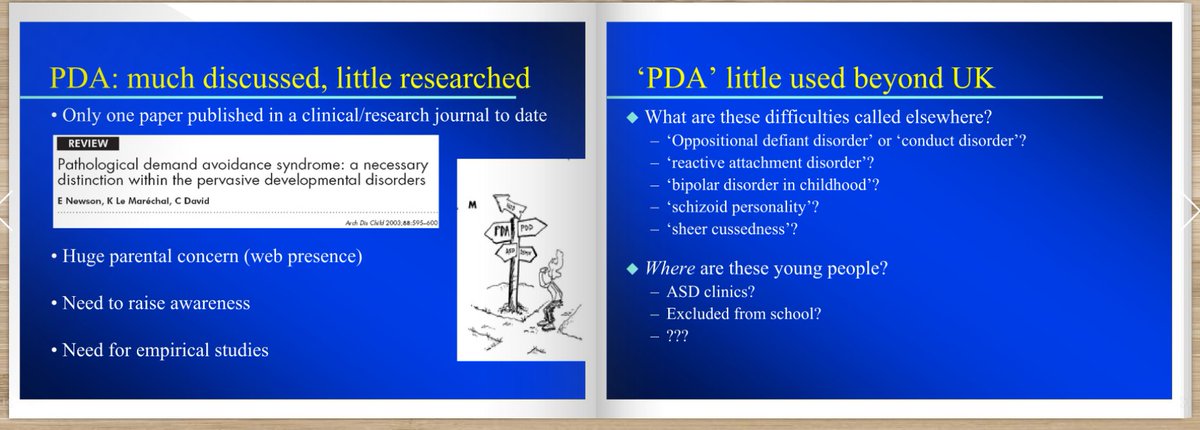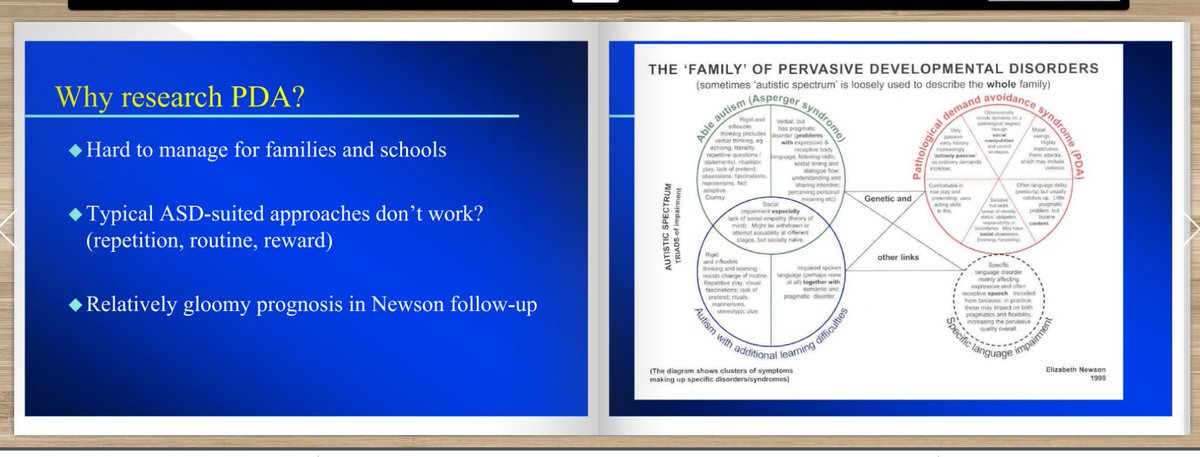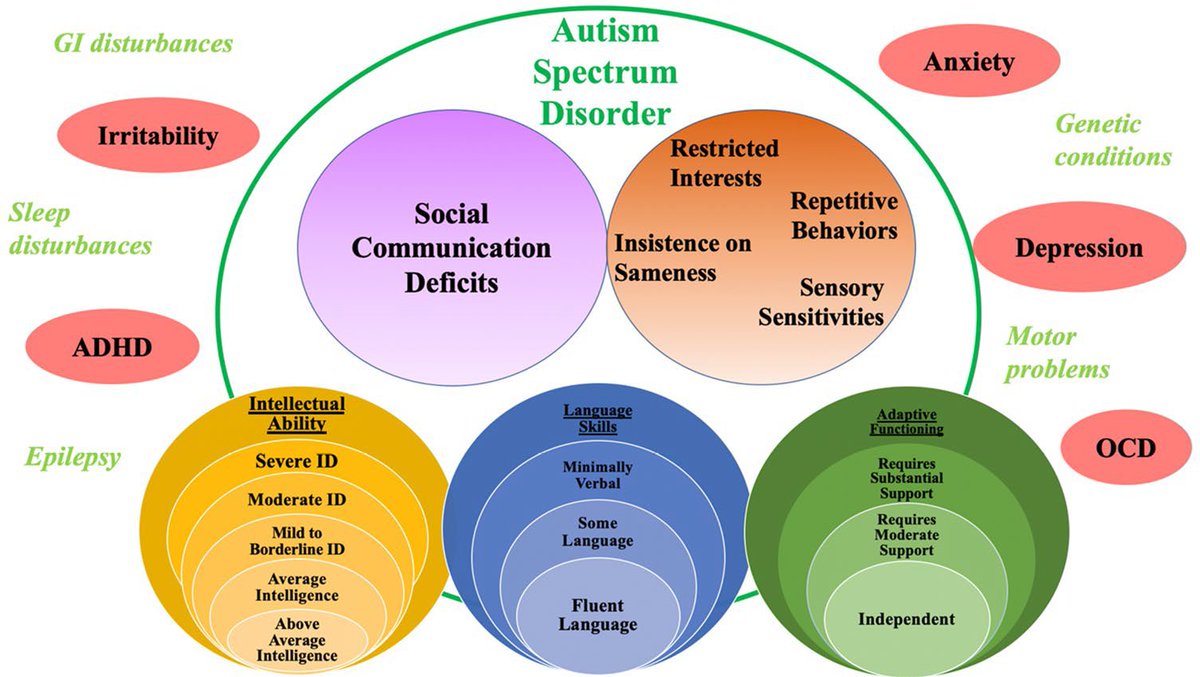
I think I have found a copy of @HappeLab & O'Nions 2011 NAS PDA conference slides!
school.youngepilepsy.org.uk/dmdocuments/mi…
school.youngepilepsy.org.uk/dmdocuments/mi…
Scratch that, I think it is this one. Apparently, they gave different versions of the talk under the same title!
anyflip.com/yexu/wqpc/basi…
anyflip.com/yexu/wqpc/basi…
Can anyone download this?
I can not, I print it off. I cannot save it except as a internet page.
I can not, I print it off. I cannot save it except as a internet page.
Although, I think @HappeLab has some explaining to do. Why they discuss PDA relating to Triad of Impairment here, but not in print. Why she discusses changes to DSM-5 ASD criteria in the talk, but not in print.
Subtext to this is that Happe was a member of the committee that set the DSM-5 ASD criteria, and discussed such things in print outside of her (co-authored) PDA scholarship.
Looking at the slides, I find it hard to think that there is any doubt that their intent is to get PDA accepted as ASD subtype. Which supports my views on what was likely contained in these slides.
There is a good case to question @HappeLab ethics on this, what she has stated elsewhere for removing autism subtypes, directly challenges reasons for viewing PDA as an ASD. She might even be one of the person's @drstevenkapp & @arineeman lobbied for ASAN.
It really should not have taken me to reference Happe's scholarship, for these points to be covered in PDA literature.
Example @HappeLab scholarship discussing removing autism subtypes, that is relevant to PDA debate I have referenced
apacu.info/wp-content/upl…
Example @HappeLab scholarship discussing removing autism subtypes, that is relevant to PDA debate I have referenced
apacu.info/wp-content/upl…
Sorry, I mean @aneeman for Ari Ne'eman.
E.g. of said scholarship of mine:
researchgate.net/publication/33…
researchgate.net/publication/33…
I can give a few reasons why I think it these slides that match up to Christie et al (2012) descriptions.
It includes what evidence will be needed to get PDA accepted into dx manuals.
Proposed ToM research.
Proposed tools, such as an observation schedule.
It includes what evidence will be needed to get PDA accepted into dx manuals.
Proposed ToM research.
Proposed tools, such as an observation schedule.
@threadreaderapp please could you unroll?
Ta in advance.
Ta in advance.
I am pretty certain there is a conflict of interest for Happe, by not discussing the issues around subtyping autism in their PDA scholarship. As it has made it easier to view PDA as an ASD, they co-authored research which views PDA as an ASD.
One can take the view Happe has benefitted from not discussing such issues in their PDA scholarship.
Which is why one can question Happe ethics on the topic.
Which is why one can question Happe ethics on the topic.
I would also point out Happe and O'Nions used the 1999 Pevervasive Developmental Disorders diagram, instead of using Newson et al (2003), diagram; this matters as it is harder to argue PDA is an ASD if they use the latest version of that image. 





For examples of research where Happe & others have viewed PDA as an ASD.
"Their apparently intact awareness of how to ‘push people’s buttons’ suggests a level of social insight that is unusual in children with ASD." p758.
acamh.onlinelibrary.wiley.com/doi/abs/10.111…
"Their apparently intact awareness of how to ‘push people’s buttons’ suggests a level of social insight that is unusual in children with ASD." p758.
acamh.onlinelibrary.wiley.com/doi/abs/10.111…
"17 PDA-relevant DISCO items were not widely endorsed in general in an autism spectrum sample, since features typical of ASD in general are unlikely to be useful in identifying a meaningful subgroup." p410
link.springer.com/article/10.100…
link.springer.com/article/10.100…
"Itshouldbenotedthat,sofar,wehave approachedthisprofile fromthestartingpoint
ofourexpertiseinASD" p2
repository.tavistockandportman.ac.uk/2165/1/O%27Nio…
ofourexpertiseinASD" p2
repository.tavistockandportman.ac.uk/2165/1/O%27Nio…
It is reasonable to view that reviewer's/ editors would ask certain questions about this approach & research, if said articles also said things like,
Subtypes were removed to reduce stigma.
No evidence of differential treatment between subtypes.
etc etc.
Subtypes were removed to reduce stigma.
No evidence of differential treatment between subtypes.
etc etc.
Like, so how does PDA not increase stigma for certain autistic persons?
If PDA is different to autism, how is it an ASD?
If PDA has anxiety based approaches, surely PDA might be better suited outside of autism?
If PDA is different to autism, how is it an ASD?
If PDA has anxiety based approaches, surely PDA might be better suited outside of autism?
If all attempts to divide autism have failed, why have you chosen an arbitrary validation threshold of 30%? How is does this research add to scientific understanding of autism? questions for DISCO paper.
etc.
etc.
Looking at the slides again, some of the proposed research is looking for what is missing/ turned off in PDA, i.e. they are looking for decifits. For example not in ToM research, but in why non-autistic CYP comply & why PDA does not. 

There is at least one positive comment about autistic persons in there, about how most autistic persons do care about other persons feelings. 

I will stop here, and the unroll.
@threadreaderapp
@threadreaderapp
I have been able to download a pdf of these slides.
• • •
Missing some Tweet in this thread? You can try to
force a refresh






















